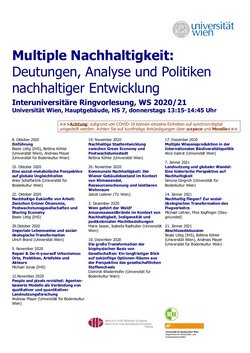Research Platform: Socio-Ecological Transformation
Socio-ecological transformation refers to the interaction processes of societies with nature. This includes material metabolism with nature - mediated through work - as well as the symbolic and cultural meaning making of nature. The manifold societal relationships with nature have become critical in the last decades and are described as socio-ecological crisis which needs to be encountered by a global sustainable development. Within this discursive framework the members of the platform participate in cutting edge investigations of the societal relationships with nature and disseminate results of the research in academic and public events, journals and news platforms. Current practice theories and a broad range of instruments of empirical research belong to the theoretical and methodological repertoire of the research.
Current Research Projects
Transformation of Cities into a Low Carbon Future and its Impact Urban Metabolism, Environment, and Society (TransLoC) (funded by Wiener Wissenschafts- und Technologiefond, WWTF)
Climate and Energy Policy Indicators in the Context of SDGs (funded by Klima- und Energiefond Austria), IHS with Wifo/Austria, Laufzeit: 2017-2018
R&DIY-U / Repair & Do-It-Yourself Urbanism (funded by bmvit, "Stadt der Zukunft", 4th call), 2017-2020
Partizipative Prozesse im kommunalen Wiener Kontext – AkteurInnen,Beteiligungslagen und sozioökonomische Hintergründe (funded by AK, Vienna), 2017-2018.
Selected Publications
- Jonas, M./Littig, B. (eds)(2017): Praxeological Political Analysis. London: Routledge
- Jonas, M./Littig, B./Wroblewski, A. (eds) (2017): Methodological Reflections on Practice Oriented Theories. Dordrecht: Springer
- Littig, B. (2017): Umweltschutz und Gewerkschaften – eine langsame aber stetige Annäherung, in: Brand, U./Niedermoser, K. (eds): Die Rolle von Gewerkschaften bei der Gestaltung einer sozial-ökologischen Gesellschaft, Wien: OEGB-Verlag, pp 195-204
- Littig, B. (2017): Good “Green Jobs” for whom? A feminist critique of the “Green Economy”, in: MacGregor, S. (ed.): International Handbook on Gender and Environment, Routledge, pp. 318-330
- Brunner, K.-M./Littig, B. (2017): Nachhaltige Produktion, nachhaltiger Konsum, nachhaltige Arbeit: The Greening of Capitalism? in: Brand, K.-W. (ed): Die sozial-ökologische Transformation der Welt. Ein Handbuch, Frankfurt: Campus, pp 215-242
- Littig, B. Combining Methods in Practice Oriented Research. The case of sustainable cohousing, in: Jonas, M., Littig, B., Wroblewski, A. (eds): Methodological Reflections on Practice Oriented Theories. Dordrecht: Springer, pp 161-176
- Littig, B. (2018): Good Work? Sustainable work and sustainable development: a critical gender perspective from the Global North, in: Rätzel, N./Stevis, D. /Uzzel, D. (eds): Labour in the Web of Life, (Special Issue of Globalizations, Taylor and Francis), 15 (4), pp. 565-579
- Barth, T./Jochum, G./Littig, B. (2018): Nachhaltige Arbeit. Die sozial-ökologische Transformation der Arbeitsgesellschaft, GAIA, 1/2018; pp- 127-131
- Kettner-Marx, C./Kletzan-Slamanig D./Köppl, A./Littig, B./Zielinska, I. (2018): Monitoring Sustainable Development. Climate and Energy Policy Indicators, in: WIFO Working Papers (573)
-
Littig, B. (2018): Good Work? Sustainable work and sustainable development: a critical gender perspective from the Global North, in: Rätzel, N./Stevis, D. /Uzzel, D. (eds): Labour in the Web of Life, (Special Issue of Globalizations, Taylor and Francis), 15 (4), pp. 565-579), https://doi.org/10.1080/14747731.2018.1454676
-
Barth, T.; Jochum, G.; Littig, B. (2019): Machtanalytische Perspektiven auf (nicht-)nachhaltige Arbeit, in: WSI-Mitteilungen, Düsseldorf, 72/1, S. 3-12
-
AG Nachhaltige Arbeit, DKN – Future Earth (2019): Positionspapier, https://irihs.ihs.ac.at/id/eprint/5048/
Coordinator
GAIA - Ecological Perspectives for Science and Society
GAIA is a peer-reviewed inter- and transdisciplinary journal for scientists and other interested parties concerned with the causes and analyses of environmental and sustainability problems and their solutions. Beate Littig is part of the Scientific Advisory Board of the journal.



